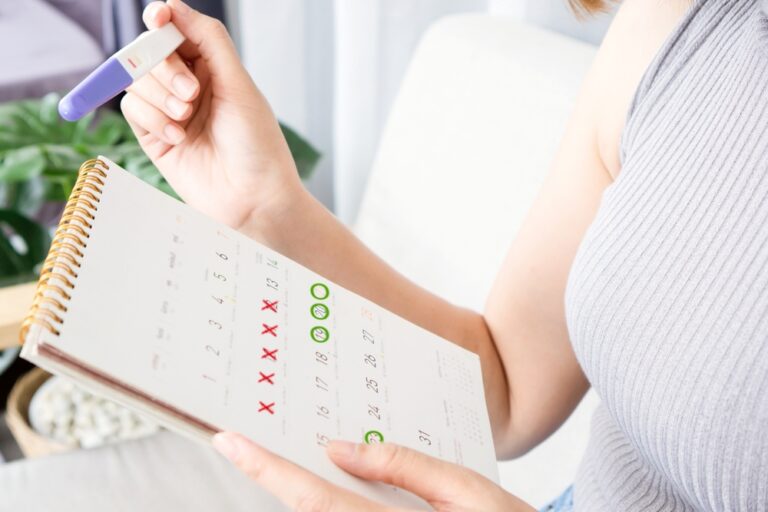Staring at those test results and not quite sure what you’re seeing? You’re not alone! Many women report confusion when reading their pregnancy test results, especially when it comes to faint lines or unusual marks that might appear on the test window.
With e.p.t. Analog Pregnancy Tests, you’re looking for clear, distinct lines that show a positive result. If you’re unsure about what you’re seeing, it’s always best to test again in a few days or consult with your healthcare provider.
How sensitive are pregnancy tests?
The sensitivity of pregnancy tests varies by brand, with e.p.t. Analog Pregnancy Tests designed to detect hCG levels present at the time of your expected period. Most home pregnancy tests can detect hCG levels around 20-25 mIU/ml, which should theoretically provide accurate results from the day of your expected period 1. However, if you take a test earlier, you might get a negative result even if you are pregnant, simply because your hCG levels aren’t high enough yet to be detected.
For a home pregnancy test to achieve 99% accuracy from the first day of your expected period, it must be able to consistently detect 25 mIU/ml of hCG. 1 Some high-sensitivity tests can detect levels as low as 10 mIU/ml, potentially allowing for earlier detection.
Understanding false results and their causes
False positives are rare but can happen for various reasons including certain medications, recent pregnancy loss, or even some medical conditions. If you get an unexpected positive result, especially if you’ve been using fertility treatments or have recently been pregnant, a follow-up with your doctor is recommended.
Research has identified several specific causes for false positive results:
- Fertility medications containing hCG can cause false positive results if testing is done too soon after administration 2
- Age-related factors in peri- and post-menopausal women, where naturally occurring low levels of hCG might trigger a positive result on very sensitive tests 3
- Recent pregnancy loss where hCG may still be present in your system 3
- Rare medical conditions including certain types of tumors that produce hCG 4
False negatives are more common than false positives. They usually occur if the test has a lower sensitivity, you aren’t using your first morning urine, or you are testing too soon after conception 5.
When to test for the most accurate results
For most reliable results, waiting until at least the day of your expected period is recommended.
If you’re eager to take a test earlier, keep in mind that even highly sensitive tests may miss early pregnancies. The hCG hormone doubles approximately every 48-72 hours in early pregnancy, so testing again after a few days significantly increases accuracy if your period hasn’t started.
What to do if you’re still uncertain
Trust your instincts and your body. If you feel pregnant despite a negative test result, wait a few days and test again. Sometimes, implantation occurs later than expected, which can delay the rise in hCG levels that pregnancy tests detect.
For the most accurate results:
- Follow test instructions precisely – including timing requirements
- Use first morning urine when hCG is most concentrated
- Wait until your period is due for highest accuracy
- Consider consulting your healthcare provider for blood tests which can detect lower levels of hCG than urine tests
Remember, pregnancy tests are screening tools, not definitive medical diagnoses. If you continue to have pregnancy symptoms after a negative test, or you have concerns about your health, it’s always best to talk to your doctor.
References
- Gnoth, C., & Johnson, S. (2014). Strips of Hope: Accuracy of Home Pregnancy Tests and New Developments. Geburtshilfe und Frauenheilkunde, 74(7), 661-669. doi:https://doi.org/10.1055/s-0034-1368589
- Mayo Clinic. (2022, 12 23). Home pregnancy tests: Can you trust the results? Retrieved from https://www.mayoclinic.org/healthy-lifestyle/getting-pregnant/in-depth/home-pregnancy-tests/art-20047940
- de Bellefonds, C. (2023, 12 27). False positives: Can a pregnancy test be wrong? Retrieved from Baby Center: https://www.babycenter.com/getting-pregnant/pregnancy-tests/can-pregnancy-tests-be-wrong_41001652
- Weiss, PhD, MPH, R. E. (2024, 7 8). What Causes a False Positive on a Pregnancy Test? Retrieved from Parents: https://www.parents.com/false-positive-pregnancy-test-8619270
- Perry, C. (2023, 12 13). Can You Get a False Negative Pregnancy Test? Retrieved from The Bump: https://www.thebump.com/a/false-negative-on-pregnancy-tests




